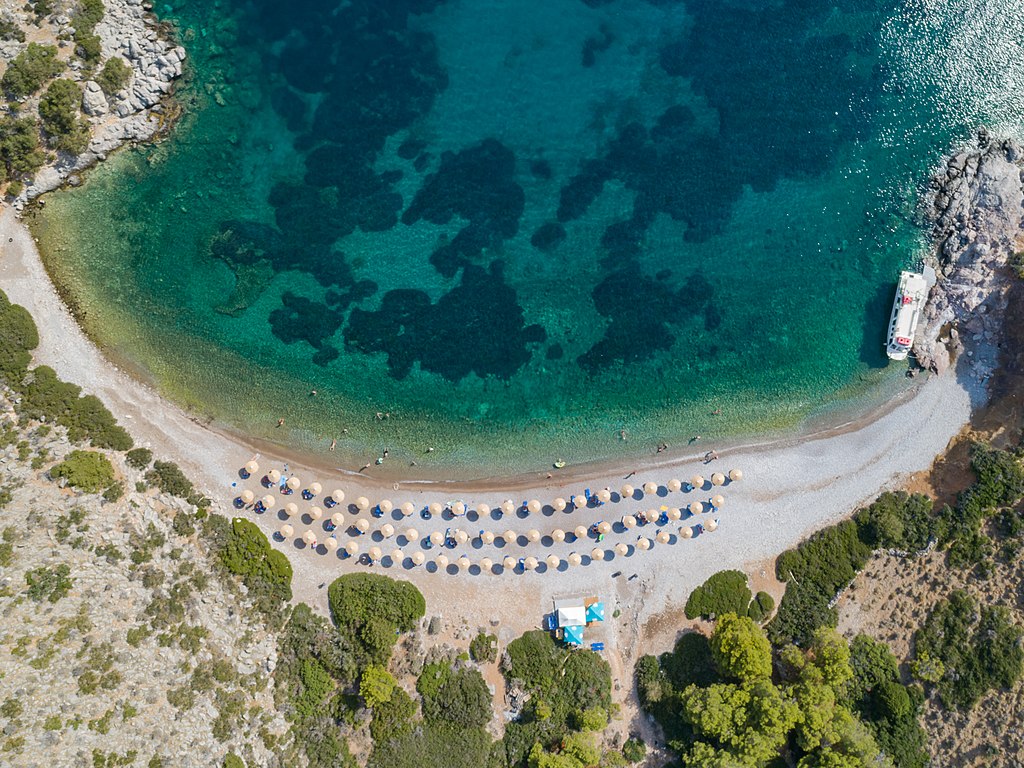
Aerial view of Agios Nikolaos Beach in Hydra, Greece. Photograph by dronepicr. Licensed under CC BY 2.0.
This week, we bring you reviews from two of our issue no. 240 contributors. If you enjoy these, why not read recommendations from four more of our Summer issue poets?
I was watching the sunset on the Greek island of Hydra with my best friend when I suddenly said, “I think I hate Henry Miller.” I’d just raced through The Colossus of Maroussi and then Tropic of Cancer. So, as my friend and I perched on rough stones by the sea, I forced her to listen to my least favorite passages from Tropic of Cancer. Miller brags about his penis—“a bone in my prick six inches long”! He catalogs what seems like “every cunt I grab hold of.” At a bar, he ejaculates on a stranger’s dress. (She’s “sore as hell.”) In 1934, when Tropic was published, this ecstatic obscenity could have been appealing; in 2022, reading it reminds me of being trapped in the bathroom queue at a party next to a coked-up man with a PhD and a browser tab permanently open to PornHub. The book feels, in Miller’s words, like “a thick tide of semen flooding the gutters.”
“I think I hate Henry Miller.” I think. Why did I qualify? Well, there is Tropic’s bravura opening. And despite the ethnographic gaze that saturates The Colossus of Maroussi, certain episodes of hilarity delighted me: the saga of Miller’s diarrhea during his visit to Crete, for example, in which he shits his pants, then shits at “the bottom of a moat near a dead horse swarming with bottle flies” and embarks on an oft-frustrated quest for “soggy rice with a little lemon juice in it” to quiet his bowels, all while touring ruins and being plied with victuals that are decidedly disquieting to his bowels. There are also passages of arresting beauty, where the writing has the feeling not of mania but of deep dreaming. Miller’s first approach to the island of Poros can only be quoted in full; it is perfect.
Does the moment redeem the mass of it? Can I recommend The Colossus of Maroussi for the sake of one gemlike isle? The question engenders other questions: what, if anything, redeems a work of literature? Is the language of redemption even appropriate? What about the language of possession? Yours, mine. Give, take. In college, listening to people debate that problematic, shifting thing called “the canon,” I privately thought that the books included in it are far weirder than either its defenders or detractors usually admit. I’ve rarely felt that what I read “excludes” me: no matter who wrote it or when, it is mine for the taking, or leaving. I cling to that feeling even now—even when I read “while it’s all very nice to know that a woman has a mind, literature coming from the cold corpse of a whore is the last thing to be served in bed.”
—Elisa Gonzalez, author of “In Cyprus”
After teaching The Epic of Gilgamesh for more than thirty years, I have only grown increasingly enamored with the myth’s iconic narratives, which depict the age-old, all too human desire for immortality. The adventures of Gilgamesh—a real Sumerian king who ruled between 2900–2350 BC—are many, and take place in both the upper and lower worlds. Around 1600–1155 BC, they were carved into clay tablets by a scribe. Herbert Mason’s translation of the myth, which captures the pathos of Gilgamesh’s heroic journey so memorably, inspired “Tablet,” my poem that appears in the summer issue of The Paris Review. I was particularly moved by the following commentary on mourning that’s delivered by the chorus in the aftermath of Gilgamesh’s dear friend Enkidu’s death:
For being human holds the special grief
Of privacy within the universe
That yearns and waits to be retouched
By someone who can take away
The memory of death.
It is Gilgamesh’s grief which allows him to transform from a misogynistic demigod/king into a fully human character who finds a way to accept his own mortality. During this time of worldwide grief following the pandemic, Gilgamesh is a beautiful reminder of the universality of that most tragic foundation of our humanity. In my apocryphal poem, I imagine Gilgamesh learning how to live, through his “special grief of privacy,” in the present: as a wise comedian, lying contentedly at last in his hammock “dreaming and waking, waking and dreaming.”
—Chard deNiord, author of “Tablet”
from The Paris Review https://ift.tt/Ua6bWDC
Comments
Post a Comment